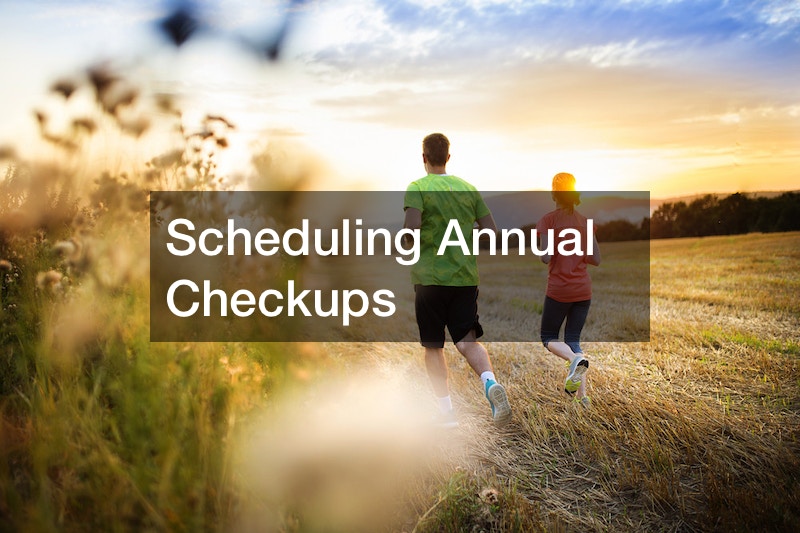
Adolescents aged 19 years are at the stage where they transition into young adults, and consequently, they have the urge to feel grown and make decisions on their own. The decisions may include, what they eat, physical activities they engage in (if any), sexual activities, and alcohol use. The question that any responsible 19-year-old should ask is; what should a 19 year old be doing to stay healthy and safe?
1. Scheduling Annual Checkups
Most parents are eager to schedule and attend doctor’s visits after a kid is born to ensure the infant is in the best possible health. A newborn should see a doctor at least six times before their first birthday, according to MyHealthFinder. Just as it’s important to stay healthy as a child, it’s also important in teenage years, and the best approach for this is getting a yearly checkup.
According to the Legal Information Institute, anyone below 18 years is considered a minor, still under a parent or guardian’s care. However, once you turn 19, you’re legally considered an adult who can make decisions independently. You might want to do many fun things with newfound freedom, but as a responsible young adult, you should ask yourself, what should a 19 year old be doing?
First, ensure you stay healthy by scheduling primary care service appointments. You can continue using the family care doctors, as you did when still under your parent or guardian. Just ensure you let them know.
2. Being Careful with School Sports
19 is the typical age of a college freshman in the US, and probably the first time they get to live away from their family. It’s both nerve-wracking and thrilling. What should a 19 year old be doing to adapt to the new environment?
Committing to playing a sport is one of the best things a 19-year-old can do to maintain optimal health in college. You can sign up for various activities, including basketball, football, tennis, swimming, and ice hockey. Whatever sport you select, staying safe is important.
Sports-related accidents, like any other accidents, are inevitable, even for professional players. For example, if you signed up for football, you could suffer a concussion when pushed to the ground. You would require to seek concussion and migraine treatments from the school doctor to ensure you are back on your feet.
How do you then ensure you minimize the effects of such accidents? First, you will need to wear safety equipment and gear. Ensure you follow the sport’s rules, take breaks to avoid injuries due to overuse, and of course, hydrate.
3. Developing an Oral Care Routine

Another answer to the question of what should a 19 year old be doing is developing an oral care routine. According to statistics, by age 34, more than 80% of Americans have gone to the dentist for at least one cavity; this is one of the many dental issues you can avoid by developing an oral care routine. You must floss and brush your teeth at least twice daily to maintain optimal oral hygiene.
Just as the analogy of sweeping the floor before mopping to ensure it is spotless, it’s advisable to floss before brushing your teeth. BRMS recommends using a toothbrush with soft bristles and toothpaste containing fluoride. You should also change your toothbrush at least three to four times a year.
Doing this ensures the bristles are effective and minimizes the accumulation of bacteria onto the brush. Otherwise, you’ll be at a higher risk of infections which can result in a dental abscess. This condition typically requires emergency dental treatments from your local dentist.
As part of your oral care routine, including mouthwash is a good idea; but you may not need to use it if you brush your teeth the recommended number of times and visit the dentist regularly. However, if you skip your morning brush due to a class you must attend as soon as possible, mouthwash is an excellent addition to your routine. It’ll help mitigate certain oral health issues before they escalate by inhibiting bacteria transfer from the toothbrush you have had for close to one year to your mouth, consequently preventing the development of a dental abscess.
4. Taking Care of Their Feet
On your 15th birthday, you may have been gifted your dream pair of shoes, but by 19 years, you’ll have outgrown the shoes. What should a19 year old be doing in such a case? As a now responsible young adult, you must let go of this pair of shoes you’ve been squeezing your feet in and get better-fitting shoes. Wearing tight shoes will cause your feet to have blisters, and remember the class you urgently needed to get to? Your tight shoes may cause you to miss them entirely.
Ensuring you cut and trim your toenails is another way to care for your feet. You don’t necessarily need to cut your toenails short. Doing this could cause you to develop ingrown and subsequent infections that may require you to schedule an appointment with your local podiatrist.
If you prefer going to a nail salon for a pedicure, ask them to sanitize all equipment and remind them not to cut your nails too short. Your feet are the foundation of the entire body. Their health will affect your overall health and lifestyle.
5. Washing Their Face

Most people don’t wash their faces or don’t do it correctly. When you don’t clean your face correctly, dirt and grime may be left on the skin, making it difficult for any product you apply to penetrate. It will also cause pores to clog, triggering the formation of pimples and acne. What should a 19 year old be doing to ensure their face is clean and acne free?
There are several acne treatments available on the market that you can use if you’re dealing with acne, dryness, and other skin concerns to get your skin back to its glory days. According to Care Credit, you can expect to spend an average of $45 to $200 monthly on these treatments. As a 19-year-old, this may be challenging to afford.
The best remedy is prevention, which is better and cheaper than cure. You can also use natural products such as facial cleansers like milk, tomatoes, and honey. These cost a fraction of other cosmetic cleansers in your local beauty supplies store.
6. Maintaining a healthy diet
According to a study by a scientist based in Utah, 88% of Americans survive on an unhealthy diet; these people not only eat the wrong food but are also not keen to ensure their quantities are right. What should a 19-year-old be doing not to be a part of this statistic? As a young adult, you’re in charge of what you eat, so resist the impulse to order a classic burger and fries for lunch or pizza every night. Instead, prioritize foods that provide your body with the nutrients it needs.
A healthy diet is vital for overall good health. If, for example, you rarely include fiber in your diet, you may have to visit the doctor for gastroenterology services. NHS recommends including foods such as bread, pasta, and rice, which are fiber-rich.
Other foods to include in your diet include at least five portions of fruit daily, proteins such as beans or eggs, dairy or soya, unsaturated spreads, and at least eight glasses of water daily. However, having the right diet in the wrong portions may also cause health complications. If you need to learn how to portion your meals, you can look up the internet or buy pre-sectioned plates for the different portions.
7. Investigating Chronic Pain

Any pain that persists for over 12 weeks, even after administering medication, is classified as chronic. According to the National Health Interview Survey, 20.5% of Americans experience pain for different reasons daily. Remember the fall you suffered during the football match.
If the pain keeps recurring, you must schedule pain specialist appointments to ensure you address it appropriately. Your overall quality of life will significantly deteriorate if you ignore or manage the pain properly. Additionally, it could result in physical and psychological issues, including depression and anxiety.
Other than injury, diseases like cancer, Aids, and gallbladder disease may also cause chronic pain. Identifying the source of your discomfort is important. Early intervention can make the difference between a life and death situation.
There are different types of chronic pain that you may experience. These include; acute pain (pain that lasts less than six months, often as a result of injuries), neuropathic pain (pain resulting from nerve damage), chronic pain ( may persist for years and its severity varies daily), and nociceptive pain( caused by external injuries). Determining the type of pain, you’re experiencing will help you manage the pain better.
8. Exercising to Keep Blood Moving
What should a 19 year old be doing to ensure blood circulates throughout the body? Exercising is a great way of achieving this and makes for great pass time activity. Luckily, you don’t need a gym membership to stay fit.
You can learn some great exercises to perform in the comfort of your home with the help of online tutorials from professional trainers. Regular exercise helps to control weight gain, strengthen muscles and bones, and lowers the risk of disorders like varicose veins, which will require the expensive services of a varicose veins surgeon. There are other noticeable benefits of exercising.
Helps to reduce the rate of heart disease: DR Kerry Stewart noted that smoking is one of the leading causes of heart disease. Exercising will help strengthen the heart muscles, and consequently, the body can better absorb oxygen. Regular physical activity also helps reduce stress and strain on the heart.
9. Getting Enough Sleep

A healthy young adult should sleep seven to nine hours every night, according to the American Academy of Sleep Medicine. However, it’s not always possible. Statistics indicate 60% of college students don’t get the recommended sleep.
It happens because they’re trying to balance their studies and social life. So, what should a 19 year old be doing to ensure enough sleep? Of course, you shouldn’t shut down your social life altogether.
You can go to all the parties you want but don’t stay the whole night. Sneak out of the party early enough to ensure you have enough time to sleep. By doing this, you’ll wake up feeling fresh and in a good mood, allowing you to perform better all day and positively impacting your overall health.
You should also limit your light exposure. Doing this is important because light controls melatonin, a natural hormone that aids in regulating your sleep-wake pattern. Your brain releases more melatonin in the dark, which makes you sleepy and less in the light, making you more alert.
Another helpful tip is to stick to a consistent sleeping cycle. It’ll help reset your body’s internal clock and improve sleep quality. Pick a bedtime when you usually feel tired to avoid tossing and turning.
Avoid taking long naps during the day so you don’t stay up all night. If you have to, limit them to no more than an hour. However, if you work night shifts, you might have to nap late in the day to ensure you’re alert during the job.
Don’t just eat anything you can find during the day; some foods negatively impact your sleep quality. It’s especially crucial in the hours before going to bed. Ensure you’re eating enough calcium, iron, and vitamin D.
You should also work on improving your sleep surroundings. A peaceful and relaxing bedtime routine triggers a signal that tells your brain it’s time to sleep. Even minor changes to your environment can make falling asleep much easier and improve your overall sleep quality.
Taking care of your health may be missing from your list of what should a 19 year old be doing. However, it’s the first step to showing you’re a responsible young adult. Don’t try to fit in by ignoring your health needs.



